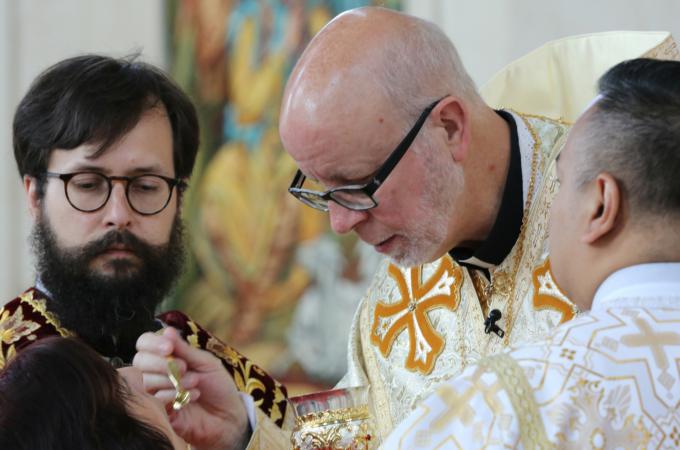What makes for Christian communion?
The question of intercommunion within our churches today is a big one, an important one, and a painful one. I'm old enough to remember another time, actually to remember two other times.
First, as a young boy growing up in the pre-Vatican II Church, intercommunion with other Christians, Non-Romans, was a taboo. It just didn't happen. An individual maverick may have ventured it, but he or she would have been called out for doing it, were it known. Then things changed. In the early years of my ministry, I worked in dioceses where intercommunion, at least for special occasions such as weddings, funerals, and inter-church gatherings, was common, even encouraged. As a priest presiding at a Eucharist at these gatherings, I was allowed to positively invite non Roman Catholics to receive the Eucharist, as their own faith and sensitivities allowed.
Those times came to an end. Within the space of ten years, by the mid-1990s, those of us who presided at a Roman Catholic Eucharist were asked to positively disinvite non-Roman Catholics from receiving the Eucharist, irrespective of occasion. The rational given was that the Eucharist is the most intimate act that we, as Christians, can share with each other and that intimate sharing, analogous to the intimacy within a marriage, to be honest and meaningful, demands that we be in communion with each other and given our differences in doctrine, ecclesiology, and some issues of morality, we simply are not in sufficient communion. Further still, this argument suggests that accepting the pain of not being able to receive communion in each other's churches should be the kick in the pants we need to stir us to make greater efforts to come together around dogma, church, and morality.
What's to be said for this? First, it's' true and has its merits, save for the one, salient, idea that needs to be lifted out from this apologia and scrutinized more closely, namely, the notion that we are not in sufficient communion with each other to share the Eucharist because of our differences in dogma, ecclesiology, and some moral issues.
What does it mean to be in communion with each other, in faith, as Christians, at least in sufficient communion to receive the Eucharist from each other's tables? What constitutes genuine intimacy in faith?
Theologically, it's clear; baptism puts us into the family of faith. All Christians hold this and so too do the Gospels. St. Paul, admittedly, adds a qualification regarding receiving communion. However, beyond the theological issue involved there's also an ecclesial one, namely, while we all share one Christian community through baptism, we do however belong to different faith families and families tend to eat in their own houses. True again. But then this question arises: When does eating in another family's house make sense and when does it not?
The deeper question which needs to be asked regarding what constitutes intimacy inside the faith and what constitutes the kind of intimacy that justifies receiving the Eucharist together is not, first of all, one of doctrine or church affiliation but of oneness inside the Holy Spirit. What makes for oneness among us as Christians? When are we one family in faith?
Perhaps no text is clearer than St. Paul in the 5th Chapter of his Letter to the Galatians. He begins by telling us what does not constitute oneness inside the Holy Spirit. We're not living inside the Holy Spirit or in communion with each other, he submits, if we're living in strife, jealousy, anger, quarrels, dissensions, factionalism, envy, idolatry, sorcery, or adultery. These are infallible signs that we're not in communion with each other. We are however in genuine communion, in intimacy in faith, in one family, when we're living in charity, joy, peace, patience, goodness, long-suffering, fidelity, mildness, and chastity. Living inside of these is what makes for Christian communion, oneness, for intimacy with each other. Differences on select issues of dogma, church, and morals are, in fact, secondary. More important is whether our heart is full of charity or anger, goodness or factionalism, peace or strife, impatience or chastity. We are more in communion, in a communion of faith, with someone of another ecclesial denomination whose heart is fueled by charity, patience, and goodness than with someone of our own church whose heart is angry, envious, and judgmental. Ecclesial difference isn't the real criterion.
What constitutes the kind of intimacy that justifies intercommunion? I'm not a bishop and so the pastoral decision on that question is not mine to make. As a loyal son of the church, I need to trust that the Holy Spirit will work through the persons and offices entrusted to make that decision. As a theologian, however, I've also a task. My job is to look at issues like this and bring various theological and biblical perspectives to bear on them, accepting that the pastoral decision won't be mine.
So I offer this perspective to those entrusted with making the pastoral decisions about what justifies and what does not justify intercommunion.
- Oblate Father Ron Rolheiser, theologian, teacher, and award-winning author, is President of the Oblate School of Theology in San Antonio, TX. He can be contacted through his website www.ronrolheiser.com.
Now on Facebook www.facebook.com/ronrolheiser



















